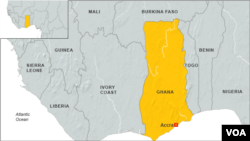As the Ebola outbreak in West Africa has worsened over the past months, countries from Cuba to Denmark to Britain have helped fight the disease. Now, it’s the United Nations’ turn.
Based in Ghana, the United Nations Mission for Ebola Emergency Response, known as UNMEER, is the world body’s effort to take the disease down for good.
Anthony Banbury, the head of UNMEER, detailed the mission’s goals to reporters in Ghana Tuesday.
"The U.N. Mission now really has just one job: to stop Ebola, to prevent it from spreading," he said. "When that job is accomplished, this mission will close up and the sooner that happens, the better; however, we have a big job ahead of us, all of us, working together with all the actors: government, aid agencies to achieve that job; to stop it where it is and prevent it from spreading elsewhere."
Ghana has offered the use of its airport as a base for the mission. UNMEER will not provide medical care, Banbury says, but coordinate logistics and policy in Guinea, Liberia and Sierra Leone, the three hardest-hit countries.
Despite numerous suspected cases, Ghana has recorded no confirmed instances of Ebola. Banbury says the U.N. mission intends to ensure things stay that way.
"UNMEER will not pose any risk or danger of any kind to the people of Ghana. On the contrary, if UNMEER were not here, if the world were not acting now in a very robust active way to stop the disease where it is, then the risks to the people of Ghana, of Benin, of Togo, of Cameroon, of Indonesia, of Brazil, that’s where the risk would occur, if we were not here and if UNMEER were not joining this international coalition to stop Ebola where it is," he said.
While there was some consternation over the mission’s presence, many Ghanaians have welcomed the U.N.’s effort to fight the disease from their country.
It’s a good thing for Ghana to be involved in, says university student Isaac Agbalati.
"They can deal with it or they can contain it," he said. "But I don’t think that it can be totally eradicated, because HIV has been there for some time now. But for now we know that it has been curtailed, it hasn’t spread as it’s supposed to be. So I think maybe that can be with Ebola also but not totally eradicating it."
The U.N. plans to act fast. In the next 30 days, the mission aims to have all its materials in place. At 60 days, it wants to have 70 percent of infected people in treatment and 70 percent of burials of Ebola victims, a key method of infection, performed safely. Both are seen as crucial to ending the disease’s spread.




